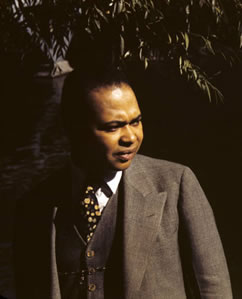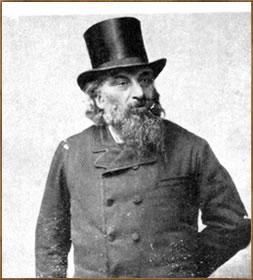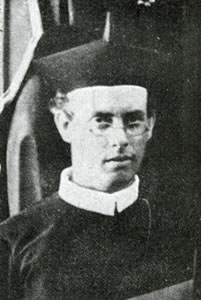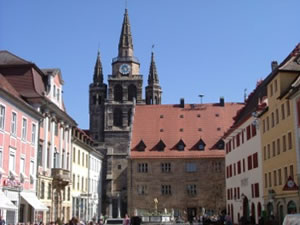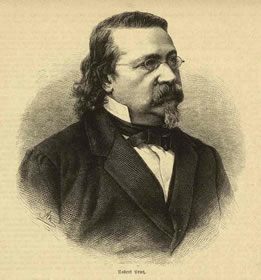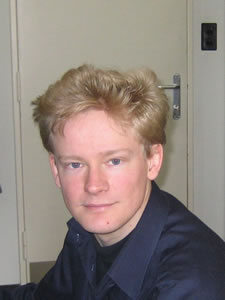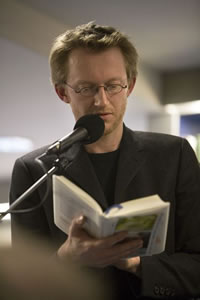De Amerikaanse dichteres en schrijfster Elizabeth Alexander werd geboren op 30 mei 1962 in New York. In januari van dit jaar had zij de eer een gedicht te mogen voorlezen bij de inauguratie van de nieuwe VS-president Barack Obama. Zie ook mijn blog van 30 mei 2008
Stravinsky in L.A.
In white pleated trousers, peering through green
sunshades, looking for the way the sun is red
noise, how locusts hiss to replicate the sun.
What is the visual equivalent
of syncopation? Rows of seared palms wrinkle
in the heat waves through green glass. Sprinklers
tick, tick, tick. The Watts Towers aim to split
the sky into chroma, spires tiled with rubble
nothing less than aspiration. I’ve left
minarets for sun and syncopation,
sixty-seven shades of green which I have
counted, beginning: palm leaves, front and back,
luncheon pickle, bottle glass, etcetera.
One day I will comprehend the different
grades of red. On that day I will comprehend
these people, rhythms, jazz, Simon Rodia,
Watts, Los Angeles, aspiration.
Ars Poetica #100: I Believe
Poetry, I tell my students,
is idiosyncratic. Poetry
is where we are ourselves,
(though Sterling Brown said
“Every ‘I’ is a dramatic ‘I’”)
digging in the clam flats
for the shell that snaps,
emptying the proverbial pocketbook.
Poetry is what you find
in the dirt in the corner,
overhear on the bus, God
in the details, the only way
to get from here to there.
Poetry (and now my voice is rising)
is not all love, love, love,
and I’m sorry the dog died.
Poetry (here I hear myself loudest)
is the human voice,
and are we not of interest to each other?
Elizabeth Alexander (New York, 30 mei 1962)
De Afro-Amerikaanse dichter Countee Cullen werd geboren als Countee LeRoy Porter op 30 mei 1903. Zie ook mijn blog van 30 mei 2007 en ook mijn blog van 30 mei 2008.
Youth Sings a Song of Rosebuds
Since men grow diffident at last,
And care no whit at all,
If spring be come, or the fall be past,
Or how the cool rains fall,
I come to no flower but I pluck,
I raise no cup but I sip,
For a mouth is the best of sweets to suck;
The oldest wine’s on the lip.
If I grow old in a year or two,
And come to the querulous song
Of “Alack and aday” and “This was true,
And that, when I was young,”
I must have sweets to remember by,
Some blossom saved from the mire,
Some death-rebellious ember
I Can fan into a fire.
Countee Cullen (30 mei 1903 – 9 januari 1946)
De Mexicaanse dichteres Pita Amor (pseudoniem van Guadalupe Teresa Amor Schmidtlein) werd geboren op 30 mei 1918 in Mexico-Stad. Zie ook mijn blog van 30 mei 2007.
Las amargas lágrimas de Beatriz Sheridan
1
You drink pure arsenicon
your long telephone,
on your bitter telephone
you breathe only cyanide.
Your tense difficult destiny
is a kiss of lethargy,
as the hell that I bear
is hellish and is mature.
When you raze the glassware,
you invent storms,
rolling around on the floor
you set the heavens to mourn.
And that so fatal kiss
was your lethal sentence
Poem XVII
From my spherical idea of things,
spring my anxieties and woes,
since geometrically, I think as equal
on the large scale and small, because by being
they are of equal importance; by existing
their sizes do not have proportions,
since they are not measured by their dimensions
and they only count because they are total
although spherically unequal.
Vertaald door Emily Hind
Pita Amor (30 mei 1918 – 8 mei 2000)
De Vlaamse dichter en schrijver Emmanuel Hiel werd geboren in Sint-Gillis-bij-Dendermonde op 30 mei 1834. Zie ook mijn blog van 30 mei 2008 en ook mijn blog van 30 mei 2006 en ook mijn blog
van 30 mei 2007.
Haar lied is lang verzwonden
Haar lied is lang verzwonden;
Mijn hart is ongerust,
Maar van zijn leed bewust
Gevoelt het bittre wonden…
Haar lied is lang verzwonden,
Mijn hart is ongerust.
Het gloeit nog, als de vlamme,
Voor haar, die mij verliet;
O, kon haar spottend lied
Mijn hijgend hart verlammen…
Maar ’t gloeit nog als de vlamme,
Voor haar, die mij verliet.
Wat blijft er mij nu over,
De wanhoop of ’t plezier?
Plezier door schuimend bier!
Of smart door mingetover!…
Wat blijft er mij nu over,
De wanhoop of ’t plezier.
Emmanuel Hiel (30 mei 1834 – 27 augustus 1899)
De Surinaamse jurist, schrijver en politicus Eduard Johan (Eddy) Bruma werd in Paramaribo geboren op 30 mei 1925. Zie ook mijn blog van 30 mei 2008.
Uit: Basya Pataka
“Well, you see, the song that you’ve heard here is ‘ningi ningi ba busara.’ It’s not only nowadays that women run off from their husbands. Long ago there was an overseer called Basja Pataka. The now dilapidated plantation is somewhere in the lower Commewijne. Now, there was a police outpost at Kunofru.10 Well, there you had the most fear-inspiring place, where slaves were sent to be broken in. If you were an evil slave, then they sent you to Kunofru to be tamed. They put a bridle in your mouth so that you could pull the pontoon filled with cane. The overseer at that place was called Basja Pataka. Well, Basja Pataka! Ho! Pataka! That is something! When he is alive and you joke with him, then he bites you in a terrible manner. When he is dead, he still bites you. For if you have a dried pataka and your hand should accidentally come near the teeth, then he’s at you at once. Even if you eat him up, still he bites you. Therefore a pataka is a terrible thing, and that man was a terrible negro. Therefore he assumed the name Pataka, and when he became overseer, all the people called him Basja Pataka.”
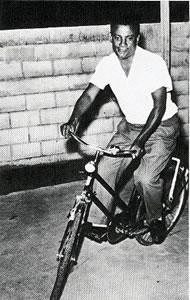
Eddy Bruma (30 mei 1925 – 6 november 2000)
De Surinaamse schrijver Henri François Rikken werd geboren in Paramaribo op 30 mei 1863. Zie ook mijn blog van 30 mei 2008.
Uit: Codjo, de brandstichter
“In den fraaien, wel onderhouden tuin, met sierlijke schulppaden doorsneden, groeide een groote verscheidenheid van schoone en welriekende planten, van Cayenne en elders aangevoerd. Nu echter geven slechts de ruïnen getuigenis van de vroegere grootheid en pracht.
Aan den grooten Combè-weg, waarheen een door dicht overhangend geboomte tamelijk donkere weg langs den gouverneurstuin leidde, stonden eenige huizen, hier en daar verspreid, waarin de majoor-commandant, officieren of voorname particulieren woonden.
In de straat achter de smederij, waarvan wij hierboven gewaagden, lag halverwege tusschen wild opgroeiende manjaboomen en struikgewassen een onoogelijk huisje als verloren. Hier woonde een lange, magere neger met een korten baard, een gebogen neus en een gunstig, regelmatig uiterlijk.
Algemeen beweerde men, dat hij een Arabier was, ofschoon het bijna zeker is dat hij tot de Tiamba-negers moest behooren, die ver uit het binnenland van Afrika als slaven naar Suriname overgebracht waren. Om zijn eerbiedwaardig uiterlijk werd hij algemeen in de wandeling Ta (vader) Tiamba genoemd. Hij was in het bezit van ezel en kar en kocht van zijn, door vlijt en zuinigheid bespaarde penningen, bij voorkeur de Tiamba-slaven, voor wie hij veel liefde en medelijden scheen te hebben, om hun vervolgens de vrijheid te schenken. Doch Ta Tiamba was niet alleen karreman; – hij gold ook als priester bij zijn landgenooten, onder wie hij een kleine gemeente gevormd had.”
Henri François Rikken (30 mei 1863 – 17 mei 1908)
De Duitse dichter en schrijver Georg Schaumberg werd geboren op 30 mei 1855 in Ansbach. Hij werkte een tijd als redacteur bij de Neuruppiner Zeitung. Vanaf 1889 leefde hij in München waar hij de leiding had over de Illustrierte Münchener Stadtzeitung. Samen met Michael Georg Conrad, Otto Julius Bierbaum en Oskar Panizza was hij medeoprichter van de Gesellschaft für modernes Leben. Behalve gedichten schreef hij ook voor het theater.
Der Dichter spricht
Nun kommt, ich will euch führen
Ein Zeichen von meiner Hand:
Es öffnen sich die Türen
Zu dem verborgenen Land
Wo unter dunklen Bäumen
Gar seltsame Blümen blüh´n,
Der Sehnsucht blassen Träumen
Gleich, die schlanken Schwäne zieh´n.
Dort Strahlen lichte Sonnen
An Himmeln, die ewig klar,
An kühlen Marmorbronnen
Harrt dort der Seligen Schar
Viel schöne, weiße Frauen
Mit Rosen umkränzt das Haupt,
Und Wunder sollt ihr schauen
Die ihr Wunder nie geglaubt.
Georg Schaumberg (30 mei 1855 – 2 maart 1931)
Ansbach (Geen portret beschikbaar)
De Duitse dichter en schrijver Robert Eduard Prutz werd geboren op 30 mei 1816 in Stettin. Van 1834 tot 1838 studeerde hij filologie in Berlijn, Breslau en Halle. Met Adelbert von Chamisso werkte hij samen aan de Musenalmanach en bij de Rheinischen Zeitung. Wegens zijn radikale politieke opvattingen trok hij in 1841 van Halle naar Jena. Wegens kritiek op de censuur moest hij ook die stad verlaten. In 1845 kreeg hij vanwege zijn stuk Die politische Wochenstube een aanklacht wegens majesteitsschennis. Van 1849 tot 1859 was hij bijzonder hoogleraar literatuur in Halle. Prutz was een van de markantste figuren van de Vormärz.
Noch ist die Freiheit nicht verloren
Noch ist die Freiheit nicht verloren,
Noch sind wir nicht, nicht ganz besiegt:
In jedem Lied wird sie geboren,
das aus der Brust der Lerche fliegt;
sie rauscht uns zu im jungen Laube,
im Strom, der sich durch Felsen drängt,
sie glüht im Purpursaft der Traube,
der brausend seine Bande sprengt.
Der sei kein rechter Mann geachtet,
dem lohne nie der Jungfrau Kuß,
der nicht aus tiefster Seele trachtet
wie er der Freiheit dienen muß.
Das Eisen wächst im Schoß der Erden,
es ruht das Feuer in dem Stein –
Und wir allein solln Knechte werden?
Ja, Knechte bleiben, wir allein?
Laßt euch die Kette nicht bekümmern,
die noch an eurem Arme klirrt:
Zwing-Uri liegt in Schutt und Trümmern,
sobald ein Tell geboren wird!
Die blanke Kette ist für Toren,
für freie Männer ist das Schwert:
Noch ist die Freiheit nicht verloren,
solang ein Herz sie noch begehrt.
Robert Prutz (30 mei 1816 – 21 juni 1872)
Onafhankelijk van geboortedata:
De Vlaamse dichter Kris Pint werd geboren in Halle in 1981. Zijn gedichten werden sinds 1995 vaak bekroond in de gerenommeerde Soetendaellewedstrijd en de Hoofdstedelijke Poëziewedstrijd. Met Finaal Credo won hij in 1997 de kortverhalenwedstrijd voor jongeren van het tijdschrift Zulma. Sinds 1998 is hij redacteur bij de Jeugdpoëziekrant. Gedichten van hem werden gepubliceerd in de bloemlezing Kruimels op de vloer. Met zijn debuutbundel Ozymandias. XXIII gedichten van voorbijgaande aard won hij de KBC Jongerenpoëziewedstrijd De Tijd in Vers (1999).
Doornroosje
Rondom mij woekerden de
rozen toen hij kwam sloegen
ze als donkere sprookjes in
mijn gevouwen handen dicht
ik was gelukkig maar zonder
schaamte bracht hij het
lichaam waarin ik droomde
als een diefstal aan het licht
zijn schanddaad werd ontdekt
en hij moest vluchten:
buiten blafte een hond
ik deed of ik sliep nog
even streelden zijn
lippen mijn mond
Kris Pint (Halle, 1981)
De Vlaamse dichter, schrijver en wetenschapper en schrijver David Van Reybrouck werd geboren in Brugge in 1971. Hij studeerde archeologie en filosofie in Leuven, behaalde een Master in World Archaeology in Cambridge en promoveerde in 2000 aan de universiteit van Leiden.Van Reybrouck is freelance-medewerker van de krant De Morgen waar hij essays, reportages en recensies schrijft voor het zaterdagsupplement Zeno en de wekelijkse bijlage Boeken. Hij schrijft ook gedichten: in het eerste nummer van Het liegend konijn, het poëzietijdschrift van Jozef Deleu, verschenen er reeds enkele. In oktober 2001 verscheen De Plaag, Het stille knagen van schrijvers, termieten en Zuid-Afrika, een mengeling van biografie, autobiografie en reportage. De Plaag werd genomineerd voor de Gouden Uil Literatuurprijs 2002 en bekroond met de Debuutprijs 2002. 2004 gaat de toneelbewerking die Van Reybrouck met Josse De Pauw maakte, Die Siel van die Mier, in première.Eind 2006 was Van Reybrouck writer in residence aan de Universiteit van Amsterdam. Kort erna, in 2007, verscheen zijn eerste roman, Slagschaduw.
De kruik
– Voor Agnès –
Jezelf zo schikkend als was ik een bad,
hoofd onder kin, rug langs mijn buik
spoel je aan in zilver en kwik.
Lig nu stil. Langzaam laat ik het water
lopen. De kruik kleedt je uit
in het helderste wit. Je hals van email,
je schouder die schatert van licht.
Sluit je de ogen, je haar wordt een wier.
Vind ik een vorm voor water dat loopt?
Het wuift en wacht, een onweer op zee,
je oogleden blijven gesloten.
David van Reybrouck (Brugge, 1971)















